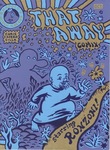
Here's a book we've really been looking forward to (and, now that the holidays are nigh upon us, we'd say there are others likely to be looking forward to this as well > hint, hint ;). It was self-published last year – with the differently tensed title of How Comics Were Made – and sold out. Now it has been released in a (lower-priced!) hardcover by Andrews ("Calvin and Hobbes") McMeel. This edition contains the entire contents of the original, with just a few tweaks, so you can get a good idea of what's in store by visiting the author's page for his self-published edition, HERE. Cool! Right? And, we've now also posted some pages from the book to help give you an even better idea of what's in store, HERE.
Just to be clear, the term "comics" in How Comics Are Made indicates, specifically, newspaper comicstrips, the "funny pages", and it is the genesis and evolution of the production processes of newspaper comicstrips that is the primary focus of this book. And while it seems as clear to Fleischman as it does to the rest of us that the vast bulk of work produced for this particular form of printed comics that dawned in the last decade of the 19th Century is likely behind us, and that this form appears to have now entered its twilight years, newspaper comicstrips nevertheless continue to be printed to this day; thus the "were" of the original title being updated by Andrews McMeel – a still active comicstrip collection publisher – to "are".
That said, as is well known by anyone schooled in comics history, comic books originated as reprint collections of newspaper comicstrips that were printed on the exact same presses using the exact same processes – just adding an extra fold and then staples and glossy covers. So, while the focus here is entirely on newspaper comics, most of the same production techniques and technologies carried over to comic book production throughout the era of newsprint comic books, which dominated American comic books until, at least, the 1980s. Thus there are plenty of insights into how comic book production evolved to be found here, as well.
How Comics Are Made was designed and illustrated by Mark Kaufman, and has an introduction by Michael Chabon, in which he reveals a personal connection – through his grandfather – to the world of newspaper production. It also includes an intriguing aside into Watergate-era Doonesbury strips that reminds us of the unique place in comics history occupied by Gary Trudeau's long-running strip.
288 pages | 10 1/2" x 8 1/4" | full color
AND, while supplies last, with an extra added bonus: All orders for How Comics Are Made now come with a free copy of Marvel Age #13, the source of the highly sought after (well, by process fiends, anyway) "How to Color Comics the Marvel Way," an eight-page feature that incorporates a chart showing all 64 possible color combinations emploiying the 25%, 50% & 100% screens of yellow, red & blue for the old school hand separations that were used for printing pretty much all newsprint comic books pre-1985 – and printed using that very process! Check out this brief post up at the Copacetic Tumblr, to get an idea of what we're talking about.










